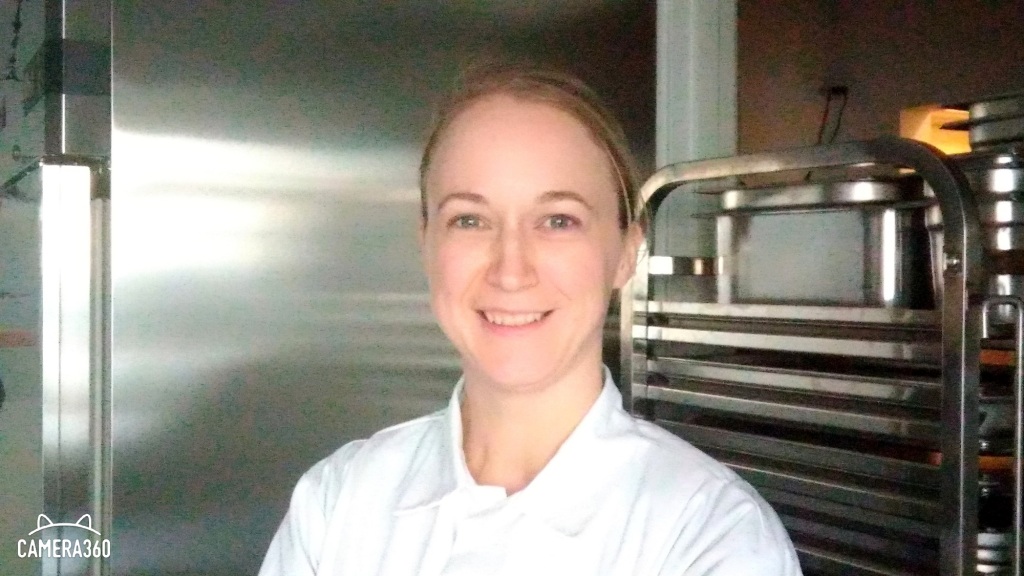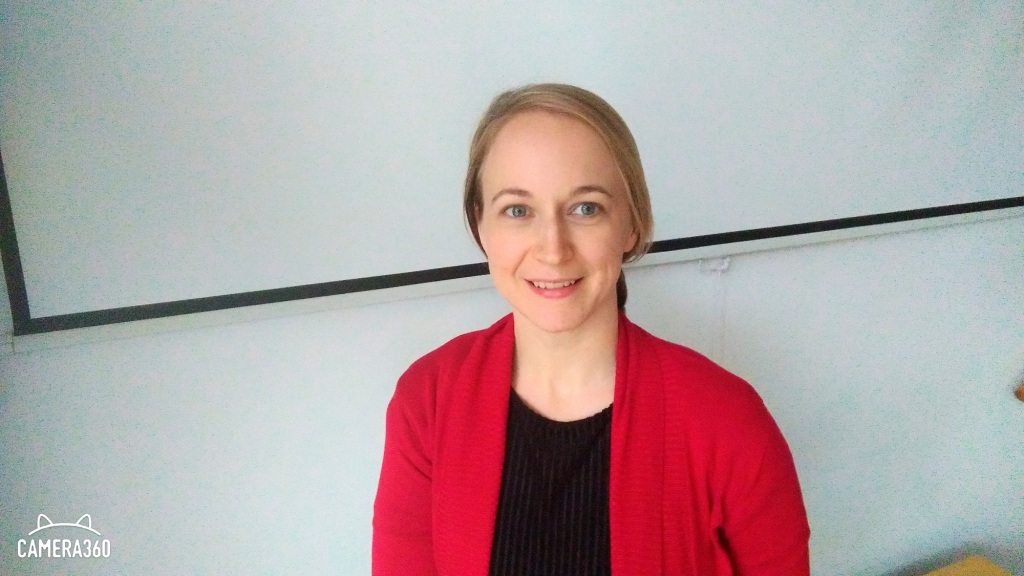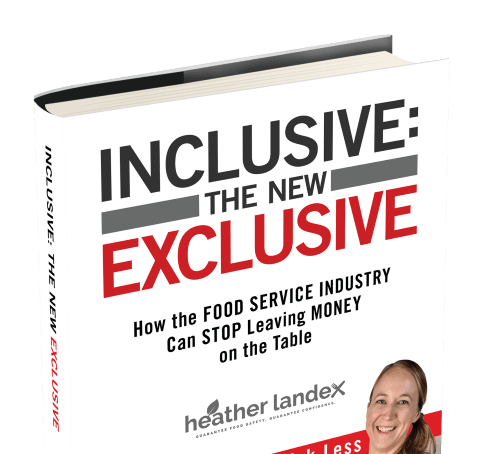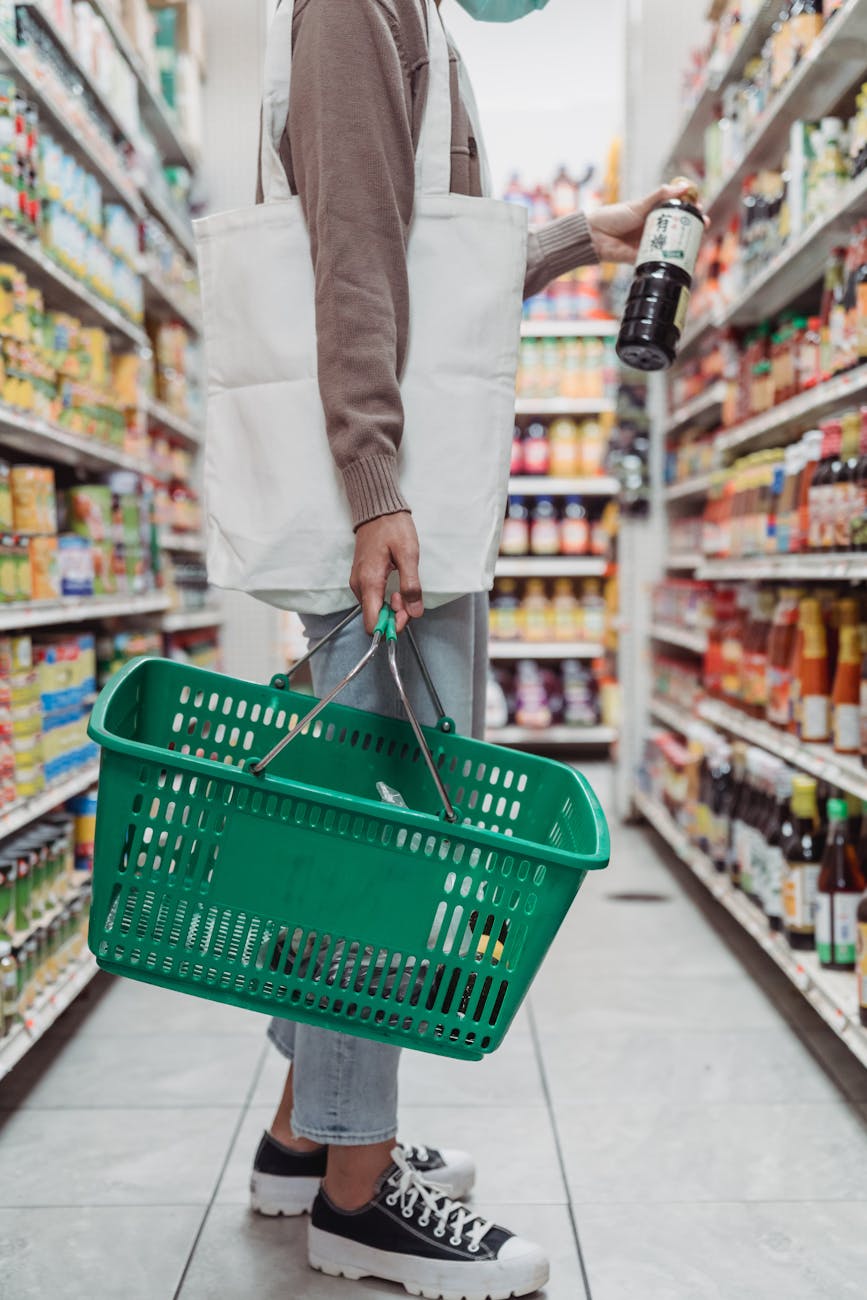I first met Food Safety professional Heather Landex in one of the networking events hosted by The Vegan Women’s Leadership Network. Heather’s goal is to spread the message of food safety and inclusivity in the food service industry.
Heather aspires to change the world, promoting food safety and inclusivity. She strives to make sure that approximately forty per cent of the population with a dietary preference is safely catered for when eating out.
There has never been before such an increased need for the food service industry to cater to a wide variety of dietary requirements.
There is no doubt that we need more professionals like Heather to help make the food service industry more inclusive to vegans, plant-based and other special diet needs customers.
Heather travels extensively to provide training, assessments, and food safety audits for food outlets, events/festivals, canteens, cafes, and restaurants.
During our chat, she made it clear that there is still a lot of work to be done to create a robust Food Safety Management System that can address dietary preferences in the hospitality and catering industry.
I am thrilled for the opportunity to speak with Heather about her work, her book ‘Inclusive: The New Exclusive. How The Food Service Industry Can Stop Leaving Money On The Table.’, and the food service industry.
“Every individual matters and deserves to be served food which is safe for them to eat and be treated with respect for their beliefs, needs and choices. I believe there is an overwhelming ignorance to how big and fast growing these market segments are, in a changing World, where diversity should be embraced and not feared.”
Heather Landex, BSc Intl Biol, MSc Env Health, MCIEH, EHRB
Heather, first of all, thank you for agreeing to be featured on GreenLivingUK. Can you please tell us about yourself and explain what a Food Safety professional is?
“Food businesses have to register with the government or local authority, the authorities then check they are preparing food safely.
A commercial kitchen is very different to hygiene at home.
Food is prepared in advance, kept warm, and high or low turnover needs to be managed with a food safety management system.
The system is a network of checks that look at the temperatures foods are stored at or cooked at, stock control, use by dates etc but then there are the activities that surround the system such as cleaning, chemical usage, pest control, staff training, and sickness policies.
A food safety professional is specialised in these systems, and the laws surrounding what food businesses must and must not do.
The aim is to protect customers from illness, injury or harm such as food poisoning.
There is also overlap with trading standards, is food labelled correctly, and is there a way to track food through the supply chain.
I am in the private sector so rather than being a food inspector I worked with improving standards to protect the company’s brand and reputation, but of course, they first have to meet the legal standards.
Unlike most food safety professionals, I look specifically at how to serve customers better, particularly those that are a bit tricky, such as allergy sufferers and vegans, I am both. I am an out-of-the-box food safety professional trying to give all the perspectives of why a higher standard, higher even than the World’s largest brands, is commercially beneficial, protecting the business’s reputation, ensuring safety and the lowering risk of ever injuring someone.
The risk is never zero, but the more people you can include when you design your menu, with good customer service, particularly to people with dietary preferences, the faster the company will grow with higher profits.”
On your website, you mention that restaurants and food outlet owners can not afford to exclude paying clients with dietary or allergy requirements anymore. Why is that?
“Particularly in the UK, the risk of fines, litigation and consequences to brand reputation are huge if a food business for example messes up allergy labelling.
They would have to recall food (which is extremely expensive) or pay damages if someone sued. The fines for food safety offences in the UK are UNLIMITED.
On the other side there are industry trends, such as the plant-based revolution, rise in veganism, an increasing focus on health and hygiene and in the near future (October 2021, an increase in strictness of allergy labelling following a media storm around the death of a 15-year-old. The law is named after her “Natasha’s Law”).
The demand for these “minority” foods is increasing.
The food supply chain is becoming more global and complex with increasing numbers of allergy suffers and increased liability and complexity of the law.
It may be as many as 1 in 10 have a food allergy of some kind, when most people assume it is 1 in 1000 or less, which is true for anaphylaxis (the most extreme kind of allergy).
An increase in diagnosis and public awareness is allowing the consumer to be better informed about their allergies.”
What are the benefits of accommodating customers with dietary preferences for the food service industry and their clients?
“It is a huge amount of effort on the part of the food business to serve someone with an allergy so often they turn them away.
However, if they do serve an allergy sufferer well, they will become their best customer, they steer the group.
Often the allergy sufferer, vegan or other preference decides (and has to look up, check and double-check) where to eat.
Then if they have a good experience they will come back again and again.
It then goes one step further, for example, vegans are usually in vegan communities, on Facebook or in real life, if they have a good experience, their network hears about it. It is the strongest form of organic marketing, and it is free.
There are also ways to encourage it. The opposite effect happens if they receive terrible service, either due to prejudices, poor standard of service or food, they are poisoned.
I say poisoned because vegan options in restaurants are particularly vulnerable to contamination with milk or egg, the most common allergies, and vegans are likely to have some level of lactose intolerance.
It is because the same care isn’t taken with a vegan dish as a dish intended for an allergy sufferer.
The customer may assume a vegan dish is naturally free from milk or egg, but it is in fact cooked in the same oil, on the same grill, and in the same pan as animal products.
What has surprised me in research for my book is, how many vegans do not care that it is contaminated with animal products, because it does not increase demand or directly cause injury to animals.
It is also why you have seen the term “plant-based” evolved, that is to appeal to all the non-vegans who eat vegan. Actually, 80% of people eating vegan, are not vegan!”


Is there a legal framework that regulates the UK’s food service industry for dietary preferences such as vegans and coeliacs? What does it cover?
“Yes, The Food Safety Act 1990*, fines for breaking its regulations are unlimited and criminal. How I summarise it, businesses need to be hygienic but also honest about the food they sell.
Coeliacs – there are rules about what can be called gluten free, and thresholds of how much gluten is allowed in food marked low gluten.
Vegan food is a can of worms and it is why I am motivated to write my book. There is no regulation of how much contamination is allowed although, how would a vegan know?
Well, they are likely to be on the scale of lactose intolerance but also their stomach probably cannot handle animal fats.
There is also a risk with vegan foods, particularly in food service, that is contaminated with milk or meat products because of the way it is cooked (same grill, oil, pan) and that is a problem for allergy sufferers and others who may assume vegan means safe for milk, egg, fish and shellfish, which are common food allergies, for which there is specific laws about declaring ingredients.
To get around the contamination problem many foods have a “may contain” disclaimer which means people with allergies are left to choose if they should eat it or not, but this disclaimer in restaurants can be avoided with good allergy management but it is not compulsory to serve people.
The way the food service industry works is they serve the majority, not the minorities.
There is the added complication that “typical” eaters may be deterred from purchasing something with vegan or free-from labels as they think something has been taken out, or it is not for them, and there is a high risk of it not tasting the same.
In the case of many foods, it doesn’t taste the same if it is free from, however, “may contain” labels are voluntary, as are “coincidently suitable for allergy sufferers, or vegans” which are rare.
Recently, Jordi Casamitjana won an employment tribunal in the UK, as he was unfairly dismissed for being an “Ethical Vegan”. This has precedented new protections against discrimination for vegans in the UK under the Equality Act 2010.”
What needs to change in the food service industry to improve customer experience, and how can you help?
“At the moment there is a lot of fear about attracting allergy sufferers to restaurants because the restaurant is very liable should something go wrong. There are a lot of prejudices around vegans.
There is widespread ignorance both on the part of food handlers and service staff but also the customer.
The average person may not realise how difficult it is to produce a special dish to meet their needs. With education and increased awareness, comes motivation, and then the food business has to invest in improving their system so they can serve these minority groups with confidence and efficiency.
A lot of the system is about communication, and having a good customer service attitude, and sometimes they will have to put in effort, even when they are extremely busy, as they have to be consistent.
They may even have to prompt or educate their customers on how to eat safely with them, such as pre-ordering, and some adaptations to their ordering systems, signage and menus.
So, the first change is mindset. I give them all the different perspectives in my book. They have to decide they want to be inclusive and then they need to check they are capable and know their limits.
They can begin by becoming simply “more” inclusive, which may involve turning away allergy sufferers more politely or communicating clearly on their website, to avoid wasting anyone’s time.
There are restaurants with filters on their online menus, which makes it easy to see if eating with them is possible for people with dietary preferences, but often there is a “may contain traces” disclaimer.
Restaurants without these disclaimers would then be more exclusive, meaning that they are the only restaurants able to serve the more severe allergy sufferers.
This is still a good start but as communication is reduced by having these online ordering systems and menus, the risk goes up that the meal is not fit for an allergy sufferer, allergy sufferers need to be warned (nicely) to ask, which isn’t always easy.”
Food safety professionals impact the health of millions of people by preventing potentially deadly diseases. Do you ever think that the work you do benefits society, and how do you feel about that?
“The work that the Environmental Health do, (Food Safety is a part of Environmental Health alongside Health and Safety, Environmental Protection and other Public Health functions), in the UK, particularly during the pandemic is a service easily as impactful as the police and doctors in protecting people and their health.
It is however preventative (to avoid disease or injury occurring etc) and so their efforts and purpose get very little credit or attention.
A lot of the experience and expertise in the field has been lost as many were made redundant and have moved to the private sector which is very different to enforcing the law.”


Soon you will be launching your first book, ‘Inclusive: The New Exclusive. How The Food Service Industry Can Stop Leaving Money On The Table.’ Can you tell us more about it?
“It is a book full of expert perspectives and stories to show the food service industry the value of including more people, such as people with dietary preferences so that they can earn more.
I create a win-win, or at least the opportunity to be safer, a bit more inclusive, and kinder. It’s very nice to be inclusive.
There are very few restaurants that do this well and many actually clearly don’t consider these people at all. They think they are a minority, which is true but it’s a much bigger market than the average person can comprehend.
This is a book to create awareness of how to serve these forgotten minority groups.
If a restaurant can serve a group with various dietary preferences, they become exclusive, because nowhere else can accommodate them.
They can get extremely good word-of-mouth referrals and loyal customers as it is basically a form of customer service, to consider these people.”
What motivated you to write about inclusivity in the food service industry, and why to write the book now?
“The thought of writing a book was and still is quite unpleasant for me. I do not like sitting alone indoors writing, I much prefer to be out talking to people about practical things. The lockdown gave me no option.
Also, most people working in regulation, compliance and as consultants can not give opinions which are too far out of the box for fear of being seen as radical or reckless.
People in the safety industry are very likely to be risk-averse. There are celebrity chefs who talk about the business opportunity but for many the task of serving e.g., allergy sufferers is too daunting.
I need to change these fixed mindsets. It is also difficult for smaller businesses to change as they don’t have the internal compliance competencies the bigger chains have.
They also may not be observing trends, as large supermarkets do, so I have tried to spell it out with examples from credible experts so that it is not just my opinion, the vegan, allergy sufferer, food safety geek but industry leaders.
I am vegan, I have lactose intolerance and last year I had a scare when I was taken by ambulance to hospital for suspected anaphylaxis. It turned out to be a severe allergy and not anaphylaxis. It opened my eyes to how it must feel to have a life-threatening food allergy.”
Who is this book for, and what does it mean for you to spread your message to a wider audience?
“This book is for primarily the food service industry (restaurants, cafes, caterers, anyone serving food to the public, including workplaces, cinemas, schools, universities, tour groups, airlines etc).
However, it is interesting for anyone making food for groups of people from small cafes, school fairs, kids’ parties, all the way up to banquets, events, conferences, and particularly charities where there are volunteers because training and knowledge in those scenarios is lowest.
Chefs are often competent in understanding how to prepare an allergy-friendly meal, however, their hands are tied because they lack space in the kitchen to keep it separated, or enough utensils, or the system or other resources.
The key people I would like to influence are the business owners or people in charge of finances or the decision makers. Everyone needs to be aware of being inclusive.
Even someone who simply wants to entertain a client, they need to pick an inclusive place to ensure everyone is comfortable and can eat.
I’m more outspoken than the typical person, so in writing this book, I am standing up for all these people who don’t want to make a fuss (which I feel is the majority of people with dietary preferences).
They just want to eat, be safe and participate in work and daily life which quite often involves food or drink.
The Food Standards Agency have a campaign called “EasyToAsk” which I think is rather sarcastic. It is definitely not easy to ask and the average customer doesn’t know what the risks are in manufacturing and catering processes. Perhaps “MakeItEasyToAsk” would have worked.
The worst affected group for allergy incidents (deaths, anaphylaxis caused by accidentally eating something they are allergic to), is 16-25year old, the reason is they are more likely to experience peer pressure, may be inexperience, lack self-confidence, be leaving home for the first time etc.
It is absolutely NOT easy to ask and be the inconvenient one in the group. It might also provoke a negative response from the server, chef or the company dining with them.
As already mentioned, if the allergy sufferer or vegan steers the group, they are going to go somewhere that is easy to ask, or easy to feel safe without asking but I would always suggest they should inform the chef that they have an allergy so that all precautions are taken.
The risk is they don’t ask as that increases the chances of their meal being unsafe.”
What else are you working on at the moment? Where do you see your career in the future?
“I want to go global and show the World not just the UK (where I am trained) how to be more inclusive and safer. I want to reach every food service outlet possible.
Rather than doing the usual compliance, I want to enhance systems, to bring joy to these neglected minorities no matter the setting.
I would like to speak to bigger and bigger organisations and train key personnel because with a bit of perspective, there are many things, they can do to be more inclusive within their own competency already.
They simply lack the Why because change is always met with resistance. Why should they put in that extra effort to upgrade their system or adapt their menus? They don’t see the money they are leaving on the table. Hence the title of my book.”
You can find out more about Heather Landex: heatherlandex.com
Order her book: book.heatherlandex.com
Connect with Heather: Facebook Instagram or email: heather @ heatherlandex .com
*The FSA summary (Food Safety Act 1990): The main responsibilities of all food businesses under the Act are to ensure that:
- businesses do not include anything in food, remove anything from food or treat food in any way which means it would be damaging to the health of people eating it
- the food businesses serve or sell is of the nature, substance or quality which consumers would expect
- the food is labelled, advertised and presented in a way that is not false or misleading.





You must be logged in to post a comment.